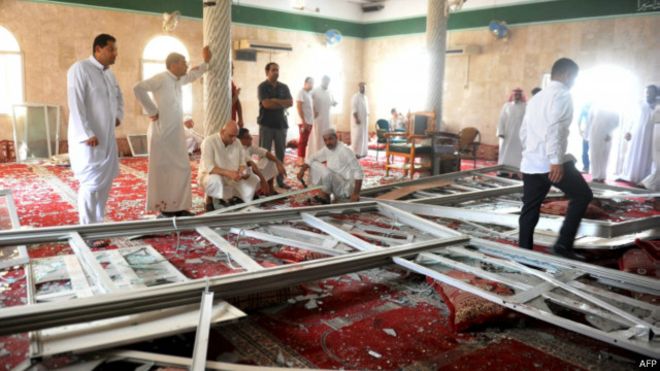
The European Saudi Organization for Human Rights (ESOHR) condemns the causes behind the nonstop extremism, which resulted in the bombing of “Imam Ali Mosque” in Al Qudayh (a city with a population of 30 thousand) located in Qatif eastern Saudi Arabia. The suicide bomb attack happened at noon on Friday, May 22, 2015 at 12:10 local time.
A suicide bomber blew himself up among a crowd of worshipers during their Friday prayer, which is usually packed at this specific day/pray and the mosque capacity around 1000 worshipers. More than 20 people were killed and wounding dozens, some in critical condition.
The ESOHR believes that the bombing is as a result of the takfiri [1]; incitement and hatred practices in which official institutions and ministries are involved in, as: “the ministry of interior”; ” the Ministry of Islamic Affairs, Endowments, Da`wah, and Guidance”; ” the Ministry of Culture and Information “; ” Council of Senior Scholars”; ” ministry of justice”. Furthermore, it is no secret that some of the ruling family members have shown sectarian viewpoint or actions against Saudi’s Shiites. Additionally, and in order to stop any forms of tolerance and communication between Sunnis and Shiites, official decisions were issued to stop the effort for peaceful coexistence between citizens. This includes the judicial decision in 11/03/2014 that sentenced the human rights activist Mekhilef Al Shammari for 2-year and 200 lashes, for multiple charges and including sitting down with Shiites. [1].
Yet, official authorities in the country still practice roles that fuel sectarianism and hatred. Citizens’ increasingly have demanded for a state pass a law criminalizing sectarianism and inciting hatred, especially after the bombing Hussainia (Al Mustafa) in November 3, 2014. This incident happened in Al-Ahsa province, the (Aldaloh) village, eastern Saudi Arabia, 7 people were killed and 9 were wounded including children and all were unarmed. Regardless of the citizens’ demands, no law was passed to criminalize sectarian. Even in the past few months, several Shiite citizens have officially informed the Ministry of the Interior on a number of tweets that takfir Shiites and incite them, yet, nothing happened.
We in ESOHR believe that fighting terrorism in Saudi Arabia requires revisions and additional legal actions in order to protect the Shiite minority of being continuously targeted; attacked or threatened. Also, stopping and prosecuting individual who incite hatred in official institutions/organizations is a must.
Based on the (International Convention on the Elimination of All Forms of Racial Discrimination), adopted by the United Nations General Assembly resolution in December 1965, Article 2 first paragraph states: (States Parties condemn racial discrimination and undertake to pursue by all appropriate means and without delay a policy of eliminating racial discrimination in all its forms and promoting understanding among all races) and the rest of the Article 2 [3], the ESOHR urgently calls the Saudi government to pass a law to criminalize sectarian and hatred, to effectively stop and prevent all affected parties in Saudi from the dangerous and unprecedented rise of sectarian violence.
The ESOHR believe that the Saudi government should urgently act and respond proportionally to the human loss and potential risks of this issue in order to fight these terrorist crimes, which is a result of sectarian and hatred, and any delay of this matter holds the state directly responsible for the possible future incidents.
[1] Wikipedia: A takfiri (Arabic: تكفيري takfīrī) is a Muslim who accuses another Muslim (or an adherent of another Abrahamic faith) of apostasy http://en.wikipedia.org/wiki/Takfiri
[2] [2] The human rights defender Mekhlef Shammari sentenced to 2-year and 200 lashes for communicating with Shiites,
violate basic law rules, The International Center for Supporting Rights and Freedom
http://www.icsrf.org/index.php?option=com_content&view=category&layout=blog&id=43&Itemid=135&limitstart=10
[3] International Convention on the Elimination of All Forms of Racial Discrimination, Adopted and opened for signature and ratification by General Assembly resolution 2106 (XX) of 21 December 1965 entry into force 4 January 1969, in accordance with Article 19 http://www.ohchr.org/EN/ProfessionalInterest/Pages/CERD.aspx
Article 2
1. States Parties condemn racial discrimination and undertake to pursue by all appropriate means and without delay a policy of eliminating racial discrimination in all its forms and promoting understanding among all races, and, to this end:
(a) Each State Party undertakes to engage in no act or practice of racial discrimination against persons, groups of persons or institutions and to ensure that all public authorities and public institutions, national and local, shall act in conformity with this obligation;
(b) Each State Party undertakes not to sponsor, defend or support racial discrimination by any persons or organizations;
(c) Each State Party shall take effective measures to review governmental, national and local policies, and to amend, rescind or nullify any laws and regulations which have the effect of creating or perpetuating racial discrimination wherever it exists;
(d) Each State Party shall prohibit and bring to an end, by all appropriate means, including legislation as required by circumstances, racial discrimination by any persons, group or organization;
(e) Each State Party undertakes to encourage, where appropriate, integrationist multiracial organizations and movements and other means of eliminating barriers between races, and to discourage anything which tends to strengthen racial division.
